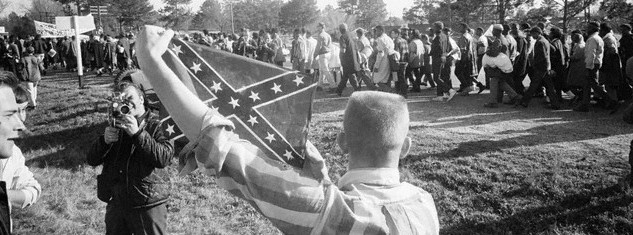This morning I received an email from a student at Walpole High School, who read my last post on the Confederate flag. His email and my response follow.
First off I’d like to make it very clear that I do not speak for every individual at Walpole High, and that my views do not necessarily represent the views of the WHS faculty or administration.
Walpole High School does not condone slavery or racism in any form. I myself, as well as many other students, often wear apparel displaying the Rebel flag, yet I do not support slavery or racism in any form. The Rebel flag was brought in as a symbol of the Rebel spirit in this town fostered by (General) John Lee, who rose our program to relevancy, success, and championship countless times. The Rebel flag, as Mr. —–I said himself, was not adopted in the interest of fostering racism and prejudice at Walpole High. I know of many students who agree with this, and think that the flag should be allowed. Likewise, I know of students who condemn what the flag once represented, regardless of the convictions surrounding it’s adoption.
However, regardless of where they stand, the majority of students would agree that the Rebel flag was not brought in for the purpose of oppression. All I ask is that you view both sides of the argument from an open minded perspective, and give your talk in a way that leaves the audience to draw their own conclusions. I appreciate you taking the time to read this e-mail. You may reference it at any time during your speech.
Let me start by thanking you for taking the time to respond to my post on the history of the Confederate flag in Walpole. I should point out that my talk next month in Walpole is not on the Confederate flag, but on a recent book that I published about an 1864 battle that included former residents of your community. These were men, who in some cases gave their lives for this nation.
I don’t believe that the meaning you assign to the Confederate flag makes you a racist. That would be an incredibly shallow basis on which to make such a conclusion. What I do have a problem with is the casual way in which the history of this particular flag is pushed aside simply because you and others choose to assign a different meaning to it. That is what I take issue with. The flag’s presence at the head of an army that functioned as the military extension of a government pledged to protect and expand slavery as well as its use during the Civil Rights Era as a symbol against the freedom movement in the South does not magically get swept under the rug. The history is there whether you choose to acknowledge it or not.
I choose to remember the bravery of Americans like Joann Bland – who I spent time with last week and who took part in the march in Selma featured in the image above – and others, who in the 1860s and 1960s sacrificed more than I ever will by never forgetting the history of that flag. You are, of course, free to choose what you believe is worth remembering and forgetting.
Thanks again for taking the time to write. I hope you can make my talk in May so we can talk in person.

>>I don’t believe that the meaning you assign to the Confederate flag makes you a racist. That would be an incredibly shallow basis on which to make such a conclusion. What I do have a problem with is the casual way in which the history of this particular flag is pushed aside simply because you and others choose to assign a different meaning to it. That is what I take issue with. The flag’s presence at the head of an army that functioned as the military extension of a government pledged to protect and expand slavery as well as its use during the Civil Rights Era as a symbol against the freedom movement in the South does not magically get swept under the rug. The history is there whether you choose to acknowledge it or not.<< I agree with this paragraph but I don't think you go far enough. It isn't just a matter of history. There are still white supremacists who use it as a symbol of opposition to civil rights for non-whites, etc.
Excellent response, Kevin. I have no idea how this school presents the Civil war and especially the fight for civil rights, but it seems to me that the social studies or history department has its work cut out for them if this young man represents a significant number of students at Walpole.
I took the time to engage this individual and I do hope he responds. Let’s try not to unintentionally insult him. Thanks for the comment and for your understanding.